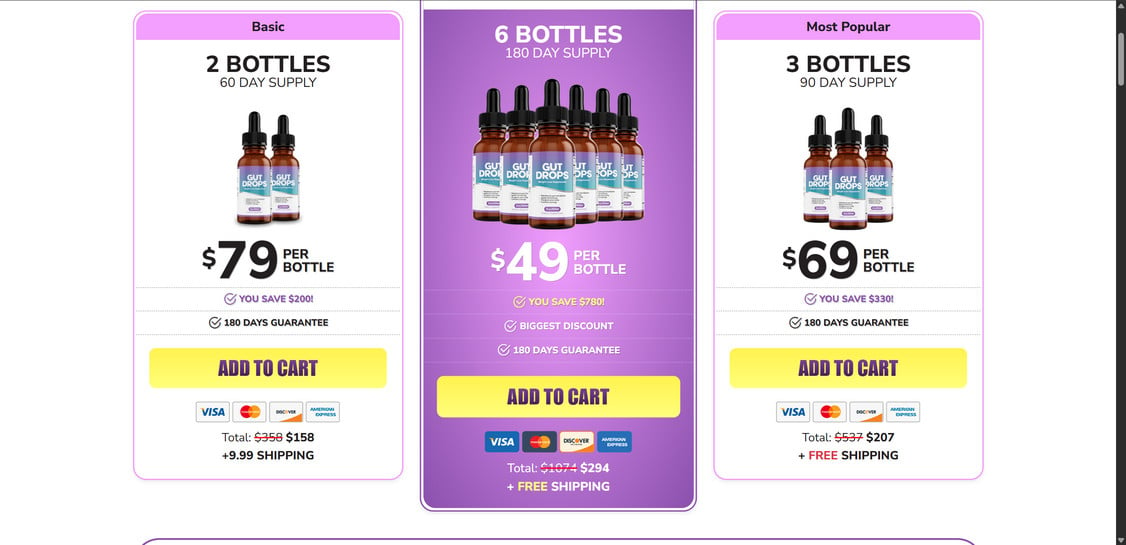Imagine being told that just one sip before bed could melt away belly fat while you sleep. Sounds amazing, right? That’s exactly what Gut Drops promises with its viral online ads. Featuring a supposed medical expert, “Dr. Emma Clark,” and incredible before-and-after stories, the campaign looks polished and convincing. But behind the sleek marketing lies a web of deceit designed to exploit hope, trust, and desperation.
In this article, we uncover the full truth about the Gut Drops ads, how it operates, and what to do if you’ve already been caught in its trap.

Scam Overview: The Reality Behind Gut Drops
Gut Drops is advertised as a cutting-edge weight loss breakthrough, claiming to tackle stubborn fat by targeting gut bacteria. Promoted heavily on Facebook, Instagram, YouTube, and Google ads, it promises that just one sip before bedtime can melt away belly fat, arm fat, and back fat without the need for diet changes or exercise routines. The product is supposedly backed by “groundbreaking research,” celebrity endorsements, and the medical expertise of “Dr. Emma Clark.”
However, every single pillar of the Gut Drops marketing campaign collapses under scrutiny.
Fictional Experts and Fabricated Testimonials
Dr. Emma Clark — portrayed as a loving mother, brilliant doctor, and researcher — is not a real person. Investigations reveal that she is an AI-generated persona, complete with deepfake visuals and a synthetic voice. No verifiable medical credentials, no research publications, and no clinic affiliations exist for her.
Similarly, glowing testimonials and before-and-after success stories displayed on the different websites are either AI-generated, fabricated, or stolen from unrelated sources. Many photos are heavily edited or sourced from stock photo libraries.
Misleading Medical Claims
The Gut Drops promotional video repeatedly references prestigious institutions like Harvard University, the London Journal of Medicine, and Johns Hopkins University. Yet:
- No real scientific studies about Gut Drops exist.
- There is no peer-reviewed research linking Gut Drops ingredients to guaranteed weight loss.
- References to institutions and journals are used purely for false credibility.
They also misuse medical jargon — such as “Christensenella bacteria” — to appear more legitimate. While Christensenella is a real genus of gut bacteria, there is no scientific proof that any over-the-counter supplement can directly manipulate it for rapid weight loss.
Fake Certifications and Illegal Use of FDA Logo
One of the most dangerous tactics employed by Gut Drops marketers is the unauthorized use of the FDA seal. This tactic is illegal and highly misleading because it falsely suggests that the product is government-approved and clinically tested for safety and effectiveness.
In truth:
- The FDA does not approve dietary supplements.
- Gut Drops has no documented safety evaluations.
- There is no legitimate clinical backing for the product’s claims.
High-Pressure Tactics and Hidden Risks
The marketing funnel uses classic high-pressure sales tactics:
- Fake urgency: “Only 7 bottles left!” or “Offer expires in 10 minutes!”
- Supposed discounts: “Get 3 bottles for the price of 1 if you buy now!”
- False guarantees: A “180-day money-back guarantee” that’s almost impossible to actually claim.
Once a customer purchases Gut Drops, they often find themselves enrolled in auto-billing schemes — being charged month after month with little to no warning, and facing almost insurmountable hurdles when trying to cancel.
Why the Scam Persists
The Gut Drops scam is successful because it preys on hope, frustration, and urgency. Weight loss is a sensitive and emotional topic. People seeking fast results may overlook red flags in moments of vulnerability.
The marketers behind Gut Drops leverage these emotions masterfully through:
- Emotional storytelling (“Dr. Clark’s fight for her family’s health.”)
- Exaggerated transformation stories.
- Fake social proof (5-star reviews that don’t exist outside their ecosystem).
In short, Gut Drops is a textbook example of a modern supplement scam — combining emotional manipulation, fake authority, misleading science, and deceptive billing practices to maximize profit at the consumer’s expense.
How the Gut Drops Scam Works
Understanding how the scam is executed can help you spot similar frauds in the future. Here’s a detailed breakdown:
Step 1: Viral Social Media Ads
Gut Drops ads appear on Facebook, Instagram, YouTube, and Google Display Network. They typically promise:
- “Lose Belly Fat While You Sleep!”
- “New Japanese Method Melts Away Arm and Back Fat!”
- “One Sip Trick Doctors Are Hiding From You!”
These ads use stock footage, dramatic music, and fake testimonials to build emotional appeal.
Step 2: The Fake Medical Authority
Once you click the ad, you are introduced to “Dr. Emma Clark,” supposedly a licensed research doctor and mother. In reality:
- Her image is an AI-generated deepfake.
- Her voice is computer-synthesized.
- She has no medical license, no real-world credentials, and no research to her name.
The character is designed to gain your trust by blending emotional storytelling with false expertise.
Step 3: The False Science and Studies
The video mentions prestigious institutions like:
- Harvard University
- The London Journal of Medicine
- Johns Hopkins University
However:
- No actual research papers are cited.
- No studies on Gut Drops exist.
- The so-called “secret ingredient,” Christensenella bacteria, while real, has no proven link to instant or dramatic weight loss through supplements.
The goal is to overwhelm you with pseudoscience until you let your guard down.
Step 4: The Product Pitch
After nearly an hour-long video filled with emotional manipulation, viewers are finally offered a “solution”:
- Buy Gut Drops directly from the landing page.
- Huge discounts if you buy multiple bottles.
- “Limited time only” urgency tactics.
- Claims of a 180-day money-back guarantee (almost impossible to claim).
There is no real “pumpkin seed recipe” — the entire setup is a bait-and-switch designed to sell an unregulated product.
Step 5: Subscription Traps and Billing Nightmares
Many who buy Gut Drops find themselves:
- Enrolled in recurring monthly subscriptions.
- Billed without clear consent.
- Struggling to reach nonexistent customer service.
Even if you return the product, refunds are often denied due to vague “terms and conditions” hidden in fine print.
What To Do If You Have Fallen Victim to the Gut Drops Scam
If you’ve already bought Gut Drops, you are not alone — and you can take action.
1. Cancel Any Future Payments
- Immediately contact your bank or credit card provider.
- Request a chargeback due to fraudulent or misleading marketing practices.
- Block any further charges from the merchant.
2. Report the Scam
- Federal Trade Commission (FTC): ReportFraud.ftc.gov
- Better Business Bureau (BBB) Scam Tracker: BBB Scam Tracker
- Internet Crime Complaint Center (IC3): IC3.gov
Provide screenshots, transaction records, and the websites involved.
3. Protect Your Personal Information
- Monitor your credit card statements carefully.
- Consider changing your email address if you begin receiving spam.
- Set up two-factor authentication (2FA) on important accounts.
4. Leave Honest Reviews
- Share your experience on Trustpilot, Reddit, Ripoff Report, and relevant Facebook groups.
- Warn others about the scam by using keywords like “Gut Drops scam” and “fake Dr. Emma Clark.”
5. Consult a Doctor if Necessary
If you’ve consumed the supplement and feel unwell:
- Seek medical advice immediately.
- Report adverse effects to the FDA MedWatch Program.
The Bottom Line: Gut Drops Is a Complete Scam
Gut Drops is a classic case of deceptive marketing designed to prey on vulnerable consumers. From fake doctors and fraudulent endorsements to AI-fabricated videos and hidden subscription traps, every element is crafted to trick you into handing over your money.
There is no easy, overnight solution for weight loss. Real health improvements come from proper nutrition, exercise, and medical guidance — not from mysterious drops advertised on social media.
Protect yourself:
- Always research a product before purchasing.
- Verify the credentials of “experts” and testimonials.
- Be wary of emotional marketing and “too good to be true” claims.
- Trust reputable sources and real medical advice.
Final Thoughts
In a world where scams are becoming increasingly sophisticated, staying informed is your best defense.
Gut Drops is not a medical breakthrough — it is a dangerous distraction from real, proven methods of achieving health goals.
If you found this article helpful, please share it with friends and family who might also fall prey to misleading weight loss scams.
Stay smart, stay safe, and always double-check before you buy.




